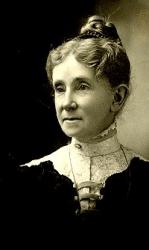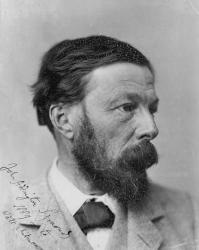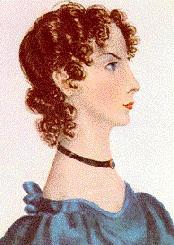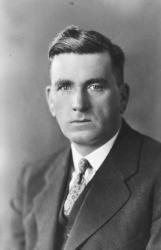Planning worship?
Check out our sister site, ZeteoSearch.org,
for 20+ additional resources related to your search.
- |
User Links
Person Results
‹ Return to hymnal






Export as CSV
Anna L. Barbauld

1743 - 1825 Person Name: Ann L. Barbould Hymnal Number: 101b English Words of "Praise to God immortal praise" in Welsh and English Hymns and Anthems Barbauld, Anna Laetitia, née Aikin, daughter of the Rev. John Ailrin, D.D., a dissenting minister, was b. at Kibworth-Harcourt, Leicestershire, June 20, 1743. In 1753 Dr. Aikin became classical tutor at a dissenting academy at Warrington. During her residence there she contributed five hymns to Dr. W. Enfield's Hymns for Public Worship, &c, Warrington, 1772. In the following year these were included in her Poems, Lond., J. Johnson, 1773. In May, 1774, Miss Aikin was married to the Rev. Rochemont Barbauld, a descendant of a French Protestant family, and a dissenting minister. For some years Mr. Barbauld conducted, in addition to his pastoral work, a boarding school at Palgrave, Suffolk. From this he retired in 1785. In 1786 he undertook the charge of a small congregation at Hampstead, and from thence he passed to the dissenting chapel (formerly Dr. Price's) at Newington Green, in 1802. He d. Nov. 11, 1808. Mrs. Barbauld continued to reside in the neighbourhood until her death, March 9, 1825. In the latter part of the same year her niece published The Works of Anna Laetitia Barbauld, with Memoir, by Lucy Aikin, 2 vols., Lond., Longman, 1825. As a writer of hymns Mrs. Barbauld was eminently successful. Their use, however, with the exception of five contributed to Dr. W. Enfield's collection, is almost exclusively confined to the Unitarian hymnals of Great Britain and America. Including these hymnals, the whole of her hymns are still in common use. These hymns appeared thus:—
i. In Dr. W. Enfield's Hymns, &c., 1772.
1. Again the Lord of life and light. Easter.
2. Awake, my soul, lift up thine eyes. Conflict.
3. Behold, where breathing love divine. Christian Charity.
4. Jehovah reigns, let every nation hear. God's Dominion. A part of this was given in Collyer's Sel., 1812, No. 586, as:—
5. This earthly globe, the creature of a day.
6. Praise to God, Immortal praise. Harvest.
ii. Poems, 1773 (Preface dated Dec. 1, 1772). The whole of the above, and also:—
7. God of my life and author of my days. To God the Father. This is an “Address to the Deity," in 80 1. It is given in Martineau's Collection, 1840 and 1873. From it the following centos were given in Collyer's Selection> 1812:—
8. God, our kind Master, merciful as just.
9. If friendless in the vale of tears I stray.
iii. Poems revised 1792.
10. Come, said [says] Jesus' sacred voice. Invitation.
11. How blest the sacred tie that binds. Christian Fellowship.
12. Lo where a crowd of pilgrims toil. Pilgrimage of Life. From this is taken:—
13. Our country is Immanuel's ground [land].
iv. Leisure Hour Improved (Ironbridge), 1809.
14. Sweet is the scene when virtue dies. Death.
v. Supplement to the Unitarian Coll. of Kippis, Bees, and others, 1807.
15. When as returns the solemn day. Sunday.
16. Sleep, sleep to day, tormenting cares. Sunday.
17. How may earth and heaven unite. Worship.
vi. Works, with Memoir, 1825.
In vol. i. most of the above are reprinted, and the following are added :—
18. Joy to the followers of the Lord. Joy. (c. 1820.)
19. Pure spirit, O where art thou now. Bereavement. This is dated 1808.
20. Salt of the earth, ye virtuous few. Salt of the Earth.
21. When life as opening buds is sweet. Death. This is dated " November, 1814."
The more important of these hymns are annotated in this Dictionary under their first lines. Mrs. Barbauld's Hymns in Prose for Children, originally published in 1781, were long popular and have been translated into French, Italian, Spanish, and other languages.
-- John Julian, Dictionary of Hymnology (1907)
===================
Barbauld, Anna L., p. 113, ii. No. 18 on p. 114, i.,should be dated circa 1820. Another hymn in common use from Mrs. Barbauld's Works, &c, 1825, is, "O Father! though the anxious fear" (E. Taylor, p. 1117, in error).
--John Julian, Dictionary of Hymnology, Appendix, Part II (1907)
See also in:
Hymn Writers of the Church
Anna L. Barbauld
Emily Huntington Miller

1833 - 1913 Person Name: E. H. Miller. (1833-1913) Hymnal Number: 68b Author of "I love to hear the story" in Welsh and English Hymns and Anthems Miller, Emily, née Huntingdon, daughter of the Rev. Thomas Huntington, D.D., was born at Brooklyn, Connecticut, Oct. 22, 1833: and was subsequently married to Professor Miller. Mrs. Miller is joint editor of The Little Corporal, published at Chicago, in which several of her poetical pieces appeared. Of her hymns the most widely known are:—
1. Enter Thy temple, glorious King. Opening of a Place of Worship. This was written for the opening of the Methodist Episcopal Church, at Akron, Ohio, 1861; and is in several collections, including the Methodist Episcopal Hymnal, 1878.
2. I love to hear the story. Early Piety. Written for and published in The Little Corporal, 1867. This is in extensive use in Great Britain and America. It was included in Hymns Ancient & Modern, in 1875.
3. Beyond the dark river of death. Heaven.
4. Blessed are the children. Early Piety.
5. Father, while the shadows fall. Evening.
6. Hark, the chorus swelling. Christmas.
7. I love the name of Jesus. Holy Name Jesus.
8. Jesus bids us shine. Early Piety.
9. Stay, trembling soul, and do not fear. Holy Communion.
10. Work and never weary, though thy strength be small. Perseverance.
Of these hymns, No. 7 is in the 1878 Additional Hymns to the Leeds Sunday School Hymn Book; No. 8, is in Barrett's Book of Praise for Children, 1881; No. 9, in Common Praise, 1879; and Nos. 4, 5, 6, and 10, in E. Hodder's New Sunday School Hymn Book, 2nd ed., 1868.
--John Julian, Dictionary of Hymnology, Appendix, Part II (1907)
=======================
Miller, Emily, née Huntington, p. 1579, ii. Of Mrs. Miller's hymns, Nos. 4, 5, 6 and 10 were written for and first printed in The Little Corporal, as follows: 4—April, 1868; 5—Aug. 1868; 6—May, 1868; and 10—Sept. 1868. Nos. 7, 8, and 9 are not hers. No. 8, "Jesus bids us shine," she informs us is by Susan Warner. [Rev. James Mearns, M.A.]
--John Julian, Dictionary of Hymnology, New Supplement (1907)
Emily Huntington Miller
John Hughes
1896 - 1968 Hymnal Number: 86b Composer of "ARWELFA" in Welsh and English Hymns and Anthems
John Hughes
D. Tecwyn Evans
Person Name: D. Tecwyn Evans (1876-1957) Hymnal Number: 17 Translator of "Iesu, Cyfaill f'enaid cu (Jesus, Lover of my soul)" in Welsh and English Hymns and Anthems
D. Tecwyn Evans
John Addington Symonds

1840 - 1893 Person Name: J. A. Symonds. (1840-1893) Hymnal Number: 55b Author of "These things shall be! A loftier race" in Welsh and English Hymns and Anthems Symonds, John Addington, M.A., s. of J. A. Symonds, b. at Bristol, Oct. 5, 1840; educated at Harrow, and Balliol College, Oxford, B.A. (double first) 1862, and Fellow of Magdalen 1862. Wrote extensively, especially on the History of the Italian Renaissance, and also published various volumes of verse. Died at home, April 19, 1893. His Life, by Horatio Brown, was published in 1895. His hymn: "These things shall be! a loftier race" (A Regenerated World), in The Methodist Hymn Book, 1901, is from his New and Old, a volume of verse by John Addington Symonds, 1880, p. 225. It begins with st. iv. of "Sad heart, what will the future bring?" a poem entitled "A Vista." [Rev. James Mearns, M.A.]
--John Julian, Dictionary of Hymnology, New Supplement (1907)
John Addington Symonds
Anne Bronte

1819 - 1849 Hymnal Number: 72b Author of "Believe not those who say" in Welsh and English Hymns and Anthems Brönté, Anne, sister of Charlotte, and daughter of the Rev. Patrick Bronte, B.A., Vicar of Haworth, Yorkshire, born at Thornton, near Bradford, 1819; died May 28, 1849. Anne Brönté was joint author with her sisters of a small volume of Poems, 1846, and personally of Agnes Grey, 1847; and The Tenant of Wildfell Hall, 1847, her nom de plume being Acton Bell. In 1851 a new edition of Wuthering Heights, by Ellis [Emily] Bell; and Agnes Grey, by Acton [Anne] Bell, was edited, with biographical notes, and selections from their papers by their sister, Charlotte Brönté. These selections consisted of poems and hymns by the two sisters. From those of Anne the following have come into common use:—
1. I hoped that with the brave and strong. Time of Sorrow. A hymn of much plaintive beauty, wrung from the writer by disappointment and affliction. It is in several collections, as Horder's Congregational Hymns, 1884, &c.
2. My God, 0 let me call Thee mine. Lent, Also very plaintive, but not so extensively in use. It is No. 291 in the Baptist Hymnal, 1879.
3. Oppressed with sin and woe. Confidence. The most popular, although not the best of her hymns. It is in many collections, both in Great Britain and America.
4. Spirit of truth, be Thou my Guide. Spirit of Truth. In a few hymnals, including Dr. Martineau's Hymns of Praise & Prayer , 1873.
-- John Julian, Dictionary of Hymnology (1907)
Anne Bronte
Ann Griffiths
1776 - 1805 Person Name: Ann Griffiths. (1776-1805) Hymnal Number: 15a Author of "Dyma babell y cyfarfod (Here is found a Tabernacle)" in Welsh and English Hymns and Anthems Griffiths, Ann, of Dolwar Fechan, Montgomeryshire, was born in 1776, and died in 1805. She composed many beautiful hymns, a collection of which was published (posthumously) in 1806, and also in 1808, under the title of "Hymnau o fawl i Dduw ac i'r oen" ("Hymns of Praise to God and the Lamb"). Several of her hymns rank with the best in the Welsh language. [Rev. W. Glanffrwd Thomas]
-- John Julian, Dictionary of Hymnology
=========================
Griffiths, Ann, p. 470, ii. A long account of this writer, and several translations into English of her hymns, are given in H. Elvet Lewis's Sweet Singers of Wales, R. T. S., 1889.
--John Julian, Dictionary of Hymnology, Appendix, Part II (1907)
Ann Griffiths
Henry Harbaugh

1817 - 1867 Hymnal Number: 26b Author of "Jesus, I live to Thee" in Welsh and English Hymns and Anthems Harbaugh, Henry, D.D., born in Franklin Co., Pennsylvania, Oct. 24, 1817, was of Swiss descent. In early life he was a farmer, carpenter, and teacher; but in 1840 he entered Marshall College, Mercersburg. Entering the ministry of the German Reformed body, he became, in 1844, Pastor at Lewisburg, Lancaster and Lebanon, Pennsylvania, and in 1864 Professor in Theology at Mercersburg. He died Dec. 27, 1867. He was Editor of the Guardian and the Mercersburg Review, in which he advocated what was called "Mercersburg Theology." His published works include sundry books about Heaven; Poems, Philadelphia, 1860, and Hymns & Chants for Sunday Schools, Lebanon, 1861. This last includes his hymns. The best known and most widely used of his compositions are:—
1. Jesus, I live to Thee. [Life consecrated to Jesus.] This hymn is dated 1850. It is No. 391 in the Hymns of the Church, N. Y., 1869; No. 255 in Allon's Supplementary Hymns, London, 1868, and is also in other collections.
2. God most mighty, sovereign Lord. [National Hymn.] Appeared in his Poems, 1860, in 8 stanzas of 8 lines, and headed, "A National Litany hymn." In some collections it is abridged, as in Hatfield's Church Hymnbook, N. Y., 1872, No. 1307; and in others part of it is altered to "Christ by heavenly hosts adored," as in the Reformed Dutch Hymns of the Church, 1869, No. 935, and others.
3. Make the cross your meditation. [Passiontide.] This translation of "Recordare sanctae crucis" (q.v.) appeared in the Mercersburg Review, 1858, p. 481, and in his Poems 1860. It is worthy of more attention than it has received.
[Rev. F. M. Bird, M.A.]
--John Julian, Dictionary of Hymnology (1907)
==================
Harbaugh, H., p. 484, ii. From No. 2, “God most mighty, &c," the cento, "Thou, by heavenly hosts adored" in the Songs of Christian Praise, N. Y., 1880, No. 658, is taken.
--John Julian, Dictionary of Hymnology, Appendix, Part II (1907)
Henry Harbaugh
John Thomas
1839 - 1921 Person Name: John Thomas. 1839-1922 Hymnal Number: 91b Composer of "ABERPORTH" in Welsh and English Hymns and Anthems Also:
Thomas, John, Llanwrtyd, 1839-1921.
John Thomas
Robert Stanley Weir

1856 - 1926 Person Name: R. Stanley Weir Hymnal Number: IX Author of "O Canada! Our home and native land!" in Welsh and English Hymns and Anthems Weir, Robert Stanley. (Hamilton, Ontario, November 15, 1856--August 20, 1926, Lake Memphremagog, Quebec). Unitarian. McGill University (Montreal), B.C.L., 1881; D.C.L., 1897. He took up law after training, and working for some years, as a schoolteacher. He began to pratise law in Montreal in 1881, and taught it at McGill 1909-1920, as well as writing articles on it, and publishing verse and prose in magazines. For the tercentenary of Quebec City (1908) he composed an English version of "O Canada" which, as kept insisting for the rest of his life, was not an attempted translation of the French lyric which Judge Adolphe B. Routhier had written for the 1880 St-Jean-Baptiste celebrations at Quebec, but an independent poem constructed to pit the tune which Calixa Lavallée had composed for that occasion. Since his poem invokes God only in the final stanza, it was never sung in church until after 1967, when Parliament took incomplete steps toward designating it as Canada's national anthem, and then usually with the amended wording proposed to Parliament in 1972, on which no definite action was then taken.
--Hugh D. McKellar, DNAH Archives
Robert Stanley Weir


 My Starred Hymns
My Starred Hymns


